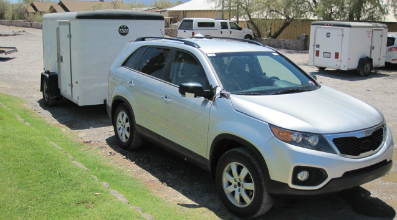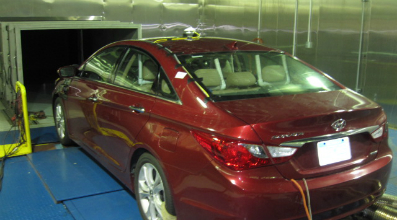Solar Instruments applied to Vehicle Testing by Hyundai America Technical Center
Published: Tuesday, August 19, 2014
Hyundai America Technical Center Inc. (HATCI) is the design, technology and engineering arm for all North American models of the global vehicle manufacturer Hyundai-KIA Motors Group. At HATCI cars are being tested to the extreme with the aim to exceed customer demands and provide the best quality and reliability. The test programmes maximize and accelerate exposure to all North American climate conditions.
HATCI headquarters are located in Ann Arbor, Michigan. There are additional facilities at the Hyundai Engineering & Design Center in Irvine, California, and at The California Proving Grounds in California City. The Proving Grounds are amongst the most comprehensive and advanced vehicle testing facilities ever built.
At the Vehicle Design, Development and Testing Department Kipp & Zonen CMP 3 pyranometers are mounted on vehicles to measure the solar load in real-world conditions. The measured solar load is then duplicated in wind tunnel test chambers for exhaustive testing of vehicle performance under a variety of road and environmental conditions.
 The Vehicle Evaluation Thermal Systems Group uses CMP 3 pyranometers to evaluate HVAC (heating, ventilation and air conditioning) and engine cooling systems in field tests in both desert and winter conditions. This way they ensure that vehicle systems respond as expected under the various sun load conditions that the North American climate offers. Pyranometers are used to measure the solar load at the roof of the vehicle and, for some tests, to measure the solar load inside the vehicle.
The Vehicle Evaluation Thermal Systems Group uses CMP 3 pyranometers to evaluate HVAC (heating, ventilation and air conditioning) and engine cooling systems in field tests in both desert and winter conditions. This way they ensure that vehicle systems respond as expected under the various sun load conditions that the North American climate offers. Pyranometers are used to measure the solar load at the roof of the vehicle and, for some tests, to measure the solar load inside the vehicle.
Another department at HATCI uses CMP 11 pyranometers, CHP 1 pyrheliometers and UVS-A-T radiometers for interior and exterior component weathering testing and full vehicle soak evaluation. The interior test employs sun tracking fixtures, sealed under glass, that simulate the cabin condition of the vehicle while the exterior test utilizes special UV reflective mirrors attached to a dual axis tracking fixture that concentrates UV radiation onto the test samples.
 The vehicle soak test utilizes production vehicles that are instrumented with thermal sensors on both the interior and exterior of the vehicle that feed back to a data logger. Soak testing is performed in a variety of climate conditions. For example, a pyranometer is mounted directly behind the front window of a car to measure the interior solar load during a full vehicle solar test at the California Proving Grounds facility.
The vehicle soak test utilizes production vehicles that are instrumented with thermal sensors on both the interior and exterior of the vehicle that feed back to a data logger. Soak testing is performed in a variety of climate conditions. For example, a pyranometer is mounted directly behind the front window of a car to measure the interior solar load during a full vehicle solar test at the California Proving Grounds facility.
Both Principal Engineer John Myers and Senior Engineer David Webb from HATCI agree “Kipp & Zonen is well known and we have been working with these instruments for many years, not just at HATCI. It was no question to choose Kipp & Zonen for our testing. It is the industry standard.”
The Hyundai America Technical Center Inc. website is at: www.hatci.com.